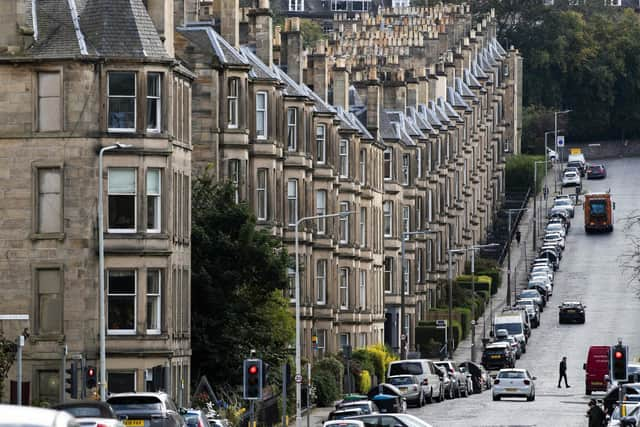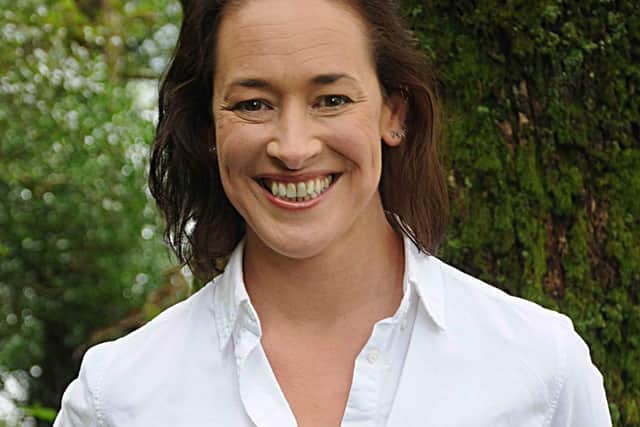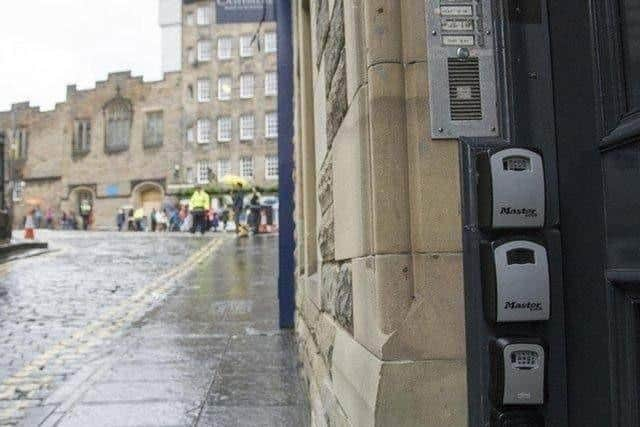Short-term lets Scotland: Thousands apply for let licences - but industry warns this barely touches the sides
Thousands have applied for a short-term let licence in Scotland since new legislation was introduced at the start of the month – but industry bodies are still warning this “has not even touched the sides” of the true number of holiday lets.
As of October 1, anyone running a holiday let, including bed-and-breakfasts (B&Bs), house swaps and glamping pods, needs to have an official licence from their local council to do so.
Advertisement
Hide AdAdvertisement
Hide AdThere was fierce opposition to the proposals before the deadline came in, with hundreds gathering outside the Scottish Parliament in protest, warning it could have a detrimental impact on the tourism industry. However, others argued the new legislation helps to regulate the industry and could lead to more homes being freed up for families to live in the long term.


Now the first few weeks of this legislation has passed, The Scotsman has taken a look at how things are faring, and has asked each of Scotland’s 32 local authorities how many applications they are dealing with.
The areas with the highest number of applications is perhaps unsurprising – of the councils that responded, Highland Council had the most applications with 7,246. Edinburgh had the second highest number with 3,573.
Other areas with high numbers of applications include Argyll and Bute, Perth and Kinross, Fife, and Dumfries and Galloway.
But the Association of Scottish Self-Caterers, which campaigned vigorously for the licence proposals to be scrapped, has warned these numbers are way below what was initially expected.


Fiona Campbell, chief executive of the association, said this meant operators had either not applied for a licence, have closed down their businesses, or the anticipated numbers were wrong to begin with.
She said: “They have based the fee structure in the Highlands on there being 10,000 short-term lets – given there are 5,500 self-catering units on non-domestic rates in the Highlands, are we to assume there are only 2,500 B&Bs, home shares and glamping pods? In other words, this is not even touching the sides to getting everyone licensed.
“Argyll and Bute had 70 per cent of its anticipated numbers applying, but because the Scottish Government didn’t have any data as a baseline, we will never know if we have reached them all – but they haven’t.”
Advertisement
Hide AdAdvertisement
Hide AdMs Campbell said she was particularly concerned about what this meant in Edinburgh, as she said there were an estimated 12,000 holiday lets in the capital.


She said: “What will happen when the Fringe comes around, and what will be the impact on the rest of Scotland? People won’t go to the Borders, because they won’t be going through Edinburgh.
“It is the most incompetent, ludicrous and impactful thing the Scottish Government will ever lay on and they know it.”
Aberdeenshire Council told The Scotsman they only received around half of the 2,000 applications they were expecting to receive. The Scottish Government commissioned independent research in 2019 and found there were 31,887 active Airbnb listings in Scotland.
Beyond this, two of the main issues flagged by councils is the influx of last-minute applications, which has caused a backlog, and applicants not having the right documents.


Aberdeenshire, Dumfries and Galloway, East Ayrshire, Falkirk, Fife, Shetland, Stirling, Glasgow, West Lothian and Western Isles councils all said there was a “late flurry” of applications “lodged at the 11th hour”. A number also said some applicants have had issues with their paperwork.
A spokesperson for Argyll and Bute Council, which received 2,827 applications, said 11 of these were invalid.
They said: “This can happen for a number of reasons, including not submitting the relevant supporting evidence. When this is the case, we work with the applicant to help them submit the right information and their application remains active in our system during this time.”
Advertisement
Hide AdAdvertisement
Hide AdEast Ayrshire Council said a number of applications they had received could not be validated because there was “documentation outstanding”. Scottish Borders Council added: “The difficulties we have faced are the number of incomplete applications that have been submitted, lack of or missing supporting documentation and the follow-up required, [and] the volume of associated telephone and email enquiries.”
Simon Ovenden, from Scottish Land and Estates, said the amount of paperwork could be one of the reasons why there had been less applications than first anticipated.
He said “One of the biggest concerns we had was there was so much additional documentation required. In the Highlands for example, operators haven’t been able to get electricians with suitable qualifications to do the tests needed to get the certificates they need.
“Some of them have been waiting for four or five months to get these tests done, but there are so few electricians there and they are overrun with short-term let operators needing tests done. They have everything else in place, but they can’t submit their application because of factors out of their control.”
The total number of applications, and the number so far approved by the council:
Aberdeenshire: 957 (208)
Argyll and Bute: 2,827
Clackmannanshire; 60 (46)
Comhairle nan Eilean Siar: 170 that have not yet been processed
Dumfries and Galloway: 1,545 (584)
East Ayrshire: 81 (16)
East Dunbartonshire: 43 (29)
East Lothian: 422 (192)
East Renfrewshire: 36 (seven)
Edinburgh: 3,573
Falkirk: 136 (22)
Fife: 1,850
Glasgow: over 1,000
Highlands: 7,246 (1,701)
Inverclyde: 65
Midlothian: 100 (10)
Orkney: 500 (189)
Perth and Kinross: 1,776 (225)
Scottish Borders: 1,100 (104)
Shetland: 351 (84)
South Lanarkshire: 221 (8)
Stirling: 544 (69)
West Lothian: 55 (38).
Aberdeen City Council and South Ayrshire Council said they could not provide the numbers unless a Freedom of Information request was submitted
Angus, Dundee, Renfrewshire and West Dunbartonshire councils were all approached for their numbers, but did not respond.
Advertisement
Hide AdAdvertisement
Hide AdAnother concern before the October 1 deadline was a warning from the industry that many holiday let operators would simply shut up shop. Some have told The Scotsman there is “anecdotal” evidence that has happened.
David Weston, from the Scottish B&B Association, said: “There was a lot of unfairness in the whole thing and we are worried we have lost some. People told us they would close on October 1 rather than apply for a licence, and in places like Skye and the other islands that could lead to a significant loss of accommodation.”
Mr Weston said the association will do a survey soon to get the true numbers.
Murdo Fraser, Conservative MSP for Mid Scotland and Fife, said he has had constituents tell him they are closing because of this legislation.
Mr Fraser campaigned against the legislation and said: “There is anecdotal evidence a lot of people have not applied for a licence, and I think what that suggests is there are people operating short-term lets who have decided not to continue with their business.
“I met someone earlier this week in that category who said it’s just not worth the cost and the bureaucracy.”
He added: “In Perth and Kinross, for example, the biggest sector in the economy is tourism, and if you don’t provide accommodation for the tourists, they won’t come. The vast majority of self-catering units, particularly in rural areas, have done so without any issues, like traditional farm cottages and holiday lodges.
“And we need to be realistic – people are not going to live in some of these properties like an eight-bed shooting lodge full time, so making it available as a holiday let is it’s only realistic use.”
Advertisement
Hide AdAdvertisement
Hide AdBut what happens to those who are now running a holiday let without a licence?
The Scottish Government says it will be able to identify these operators as they will have to include their licence number in their adverts, and fines could be up to £2,500.
A spokesperson for Western Isles Council added those running holiday lets and taking bookings without a licence were now considered to be doing so “illegally”.
Ms Campbell said: “Will this solve the housing crisis? No. People’s livelihoods are being lost and it will lead to an increase in second homes.
“This does nothing, but make us look like a laughing stock to the rest of the world. That will come back to the Government because it will have an impact on attractions when there’s nowhere in the area for visitors to stay.
“We also don’t know how many jobs like cleaners will be lost by the impact this will have on the supply chain. It will have an impact on the whole of the Scottish economy, and I really hope the Government feels content with that.”
A Government spokesperson said: “Licensing of short-term lets will, for the first time, mean we have reliable and up-to-date data about the sector in Scotland.
“We’ll use this data and other information gathered during engagement with licensing authorities and other stakeholders, as part of ongoing monitoring, and also to provide Parliament with an update on implementation in early 2024.
Advertisement
Hide AdAdvertisement
Hide Ad“The introduction of licensing safeguards the role short-term let accommodation plays in our economy by providing assurance to guests on safety and quality, such as gas certificate compliance and suitability of electrical equipment.”
Comments
Want to join the conversation? Please or to comment on this article.